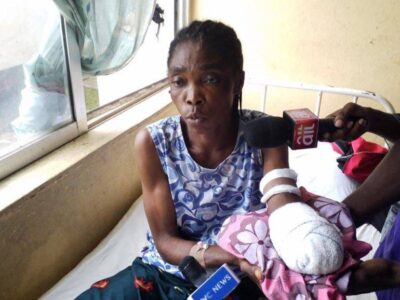
Boko Haram terrorists killed more people than Islamic State in Iraq and Syria combined
Nigerian Wanhena Sheku was working alone on her farm when a group she identified as Fulani herdsmen attacked her in mid-October, 2019.
“They told me to place my left arm on a wooden log before they hacked my hand off. Then they took my severed hand and ran away. I managed to make it to my village before collapsing from loss of blood. Fortunately they took me to hospital in Makurdi. But what harm was I doing? And I’m breastfeeding: how can I manage with only one hand now?’
Makurdi is the capital of Benue State and quite near its northern border with Nasarawa State. Wanhena’s village was on that border; the area is known as the ‘bread basket of the nation’.
Mrs Sheku’s attack is just one among 21 pages of incidents of violent attacks which took place across the north and Middle Belt of Nigeria, Africa’s most populous nation, between 1 December, 2019 and 11 April, 2020. This data set, compiled from the Armed Conflict Location and Event Data Project (ACLED), a Washington based non-profit organization, comprises deaths and attacks perpetrated by all groups.
Benue State Governor Samuel Ortom said yesterday that 180,000 people are currently Internally Displaced (IDPs for short) living in 8 camps across his state. Another half a million are living with relatives because they’ve been driven out of their homes, or out of fear of attack.
In 2018, he reported to the UN that in Benue, between 2013-2018, 526 women were killed; and 149 schools were destroyed in 2011-17.
Meanwhile ACLED data finds, for instance, that in north-east Nigeria, the extreme Islamist militants Boko Haram – whose impact has now spread across the Lake Chad region into several neighbouring countries from its start in 2009 in Maidugiri – has killed more people than Islamic State killed in Iraq and Syria combined.
This number of 27,000 dead at the hands of Boko Haram over the past ten years is in the latest – and most detailed and comprehensive – new report tracking the violence occurring across Nigeria. Figures cover both violence perpetrated by Boko Haram and (less well-known internationally but just as deadly) that carried out by mainly-Muslim Fulani militant herders on mainly-Christian farmers, and occasionally vice-versa.
There have been almost 47,000 deaths from ‘ALL’ actors, including Fulani militants, ‘bandits’ and ‘criminals’ from 2015 up to 31 January 2020), it says, with a total of over 86,000 deaths over the past ten years.
Meantime over the past 20 years, nearly 19,000 people have been killed by extremist militant Fulanis, with over 43,000 Nigerians – the vast majority women and children – killed by Boko Haram over the same period. (Boko Haram mainly started using violence from 2009 onwards).
In addition to Boko Haram, “Fulani militias in central Nigeria are also committing crimes against humanity and genocidal massacres against Christians,” Greg Stanton of Genocide Watch says in the report: “What is mistakenly portrayed as a conflict between herders and farmers is actually a genocidal war between ethnic groups that previously co-existed, ignited by Islamic extremists with modern weapons.”
The 311-page report, ‘Nigeria’s Silent Slaughter: Genocide in Nigeria and its implications for the International Community’, is a collaboration between networks in Nigeria and amongst its diasporas in the UK and the US, co-ordinated by the International Committee On Nigeria (ICON), and the International Organisation for Peace-building and Social Justice (PSJ).
The researchers go to some lengths to explain how they merged, compiled, extrapolated and edited the data, explaining that “We expect a 10-12% error based on numerous duplicates, sources, reiterations of reported incidents, deaths, sources, etc”.
Source: World Watch Monitor





